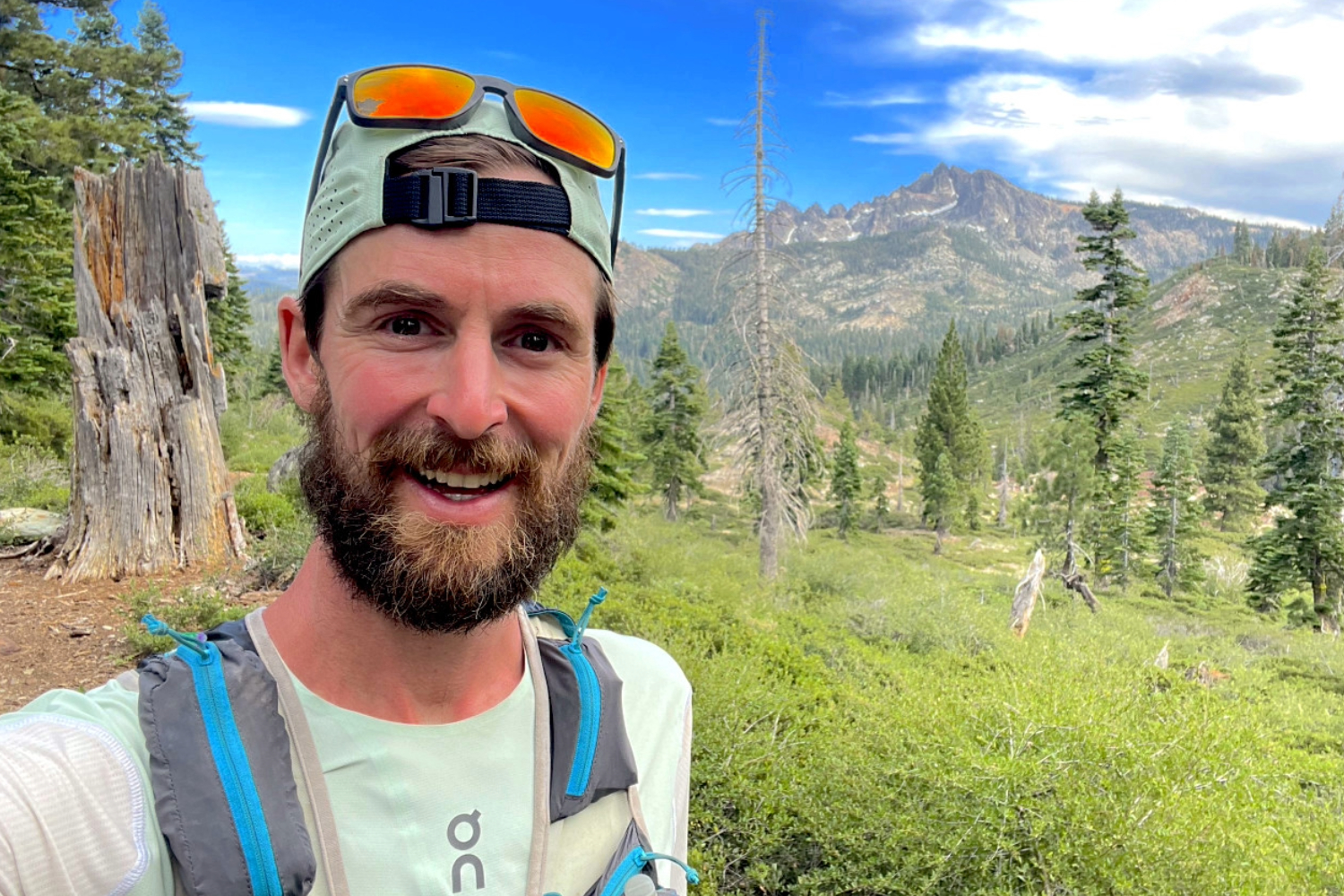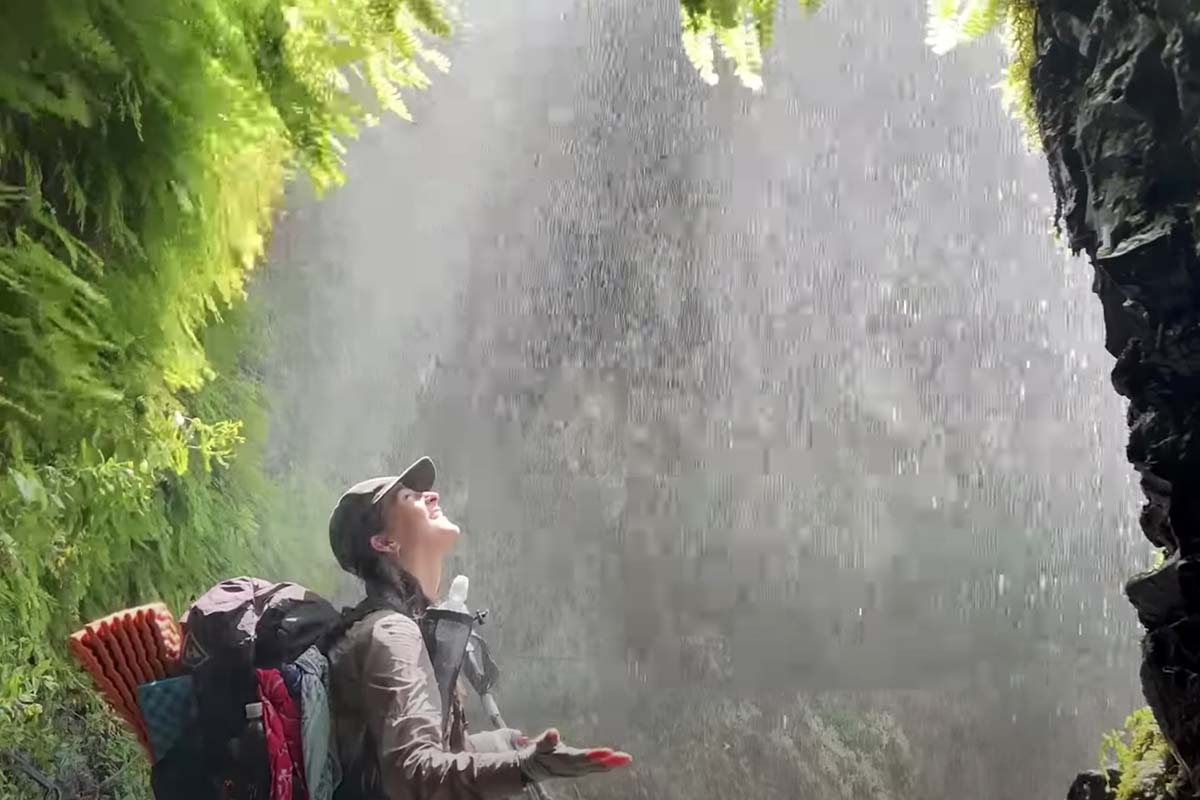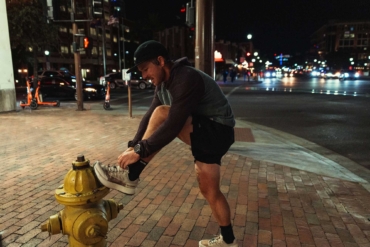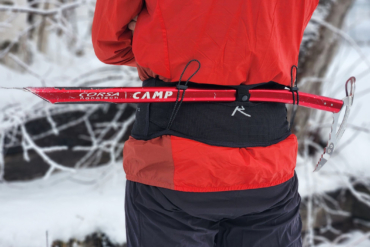Karel Sabbe calls the Pacific Crest Trail (PCT) his favorite hike in the world. He’s “hiked” it twice now, and both times he’s set the record for the fastest it’s ever been done.
That’s no small feat. The PCT is 2,653 miles, winding from the U.S.-Mexico border to the U.S.-Canada border, climbing 420,880 vertical feet total, and passing through desert, forest, alpine tundra, grassland, and even rainforest. On average, it takes the supported hiker 5 months to complete.
The first time Sabbe hiked it, he finished in 52 days, 8 hours, and 25 minutes. It was the fastest known time (FKT) up to that point. But he couldn’t shake the feeling that he could do it faster.
“Back in 2016, that was my first time doing [an FKT] like that, so I made a lot of mistakes. And I knew I left something out there,” Sabbe told GearJunkie. “Maybe not physically or mentally, but just logistically and how to approach an attempt like that.”
He says he suffered through that race. His sleep pattern fell totally out of whack (as it does for most who attempt these FKTs). His feet were shredded and his body was wrecked.
In 2022, Timothy Olsen broke Sabbe’s 2016 FKT, hiking the trail in 51 days, 16 hours, and 55 minutes. So this year, Sabbe returned to reclaim his record. And to do that, he’d have to keep up an average of about 60 miles per day. It was an ambitious pace, sure. But it was one Sabbe knew he could maintain — especially with all the knowledge around long-distance running objectives he’s gathered since his last attempt.
Sabbe departed from the Mexico border on July 10, 2023. And on Saturday, August 26, he reached the U.S.-Canada border, his goal accomplished — with time to spare. Sabbe had completed the Pacific Crest Trail in just 46 days, 12 hours, and 50 minutes, beating Olsen’s time by over 5 days, and beating his previous record by more than 6 days.
It’s an insane new record and one that will be immortalized in a documentary covering the journey that will be released in early October, according to Sabbe.
We caught up with the Belgian ultra-thru-hiker to talk about the adventure, his gear, and finally, the support crew he couldn’t have done it without.
Q&A With FKT Athlete Karel Sabbe
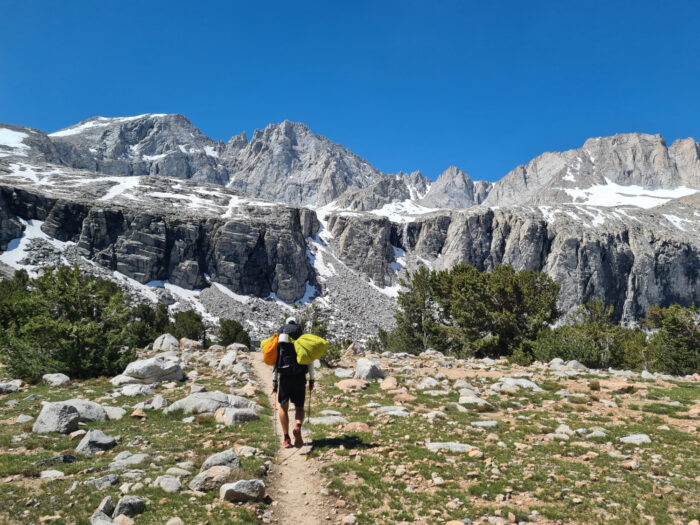
GearJunkie: Is the Pacific Crest Trail still your favorite trail after your second FKT?
Karel Sabbe: Yeah. It is so wild and so unique. The scenery is so diverse. You get into the desert first and then Yosemite, Kings Canyon National Park, Lassen Volcanic National Park, and then Oregon, Washington. I mean, I really enjoyed the Appalachian Trail, but they call it a green tunnel. So you’re running in the forest all the time and every now and then you get a view. But the PCT is so much more diverse and so, so much more wild.
What were some of the things that you did differently this time that kind of helped you move faster?
My team. So last time, it was just me and my brother-in-law. But now [I had] four for support, so we had Henri, Kobe, Anna, and my wife, Emma. And that meant that we could do meet-ups more efficiently. We could pick campsites where we’d camp more easily.
Like Henri would hike in with a backpack and he’d set up camp. Because he could do that, we could try to aim for 60 miles every day, whereas last time we were more restricted to [meeting at] road crossings because there was only one person supporting me.
Then gear-wise I had more shoes, different types of shoes, more socks. I did a lot of stuff to take care of my feet to keep them in shape. That was super important.
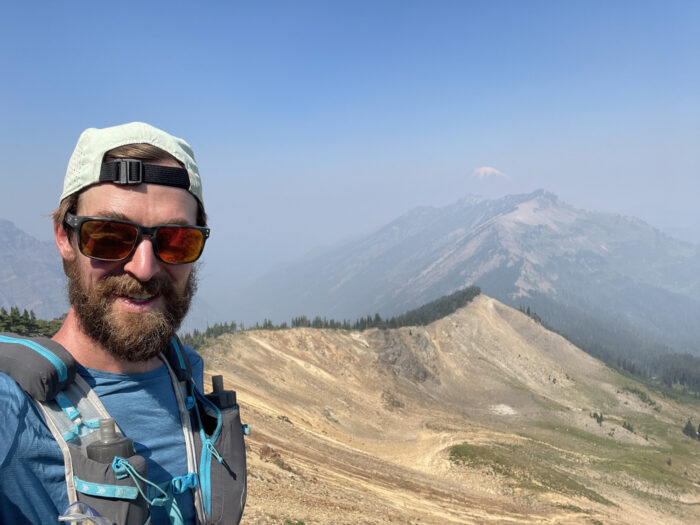
Were there any pivotal moments on this FKT that stick out in your mind as important?
Yeah, for sure. As we got near the High Sierra, we knew it was going to be the craziest year ever in because of the record snowfall. It was insane how much snow had fallen this winter. So, so much of that was still on the passes, and the streams were all still flooded.
So, we reached out [to Backcountry] and got ice axes and microspikes to safely traverse the High Sierra and that significantly slowed me down… I started actually hiking with a proper backpack to get all the gear and everything.
That was a key moment as well where we realized we did the two most difficult passes or highest passes of the entire PCT. It was doable, it was slow, but we did it. We were losing time, but the attempt was still on. That was a really beautiful moment.
How much sleep were you getting out there on the trail?
I have found my sweet spot to be around 7 hours. So, that’s pretty long. But then during the day, it’s all about moving forward, right? So I’m not messing about.
What was the typical day like?
Basically, my approach is to set my alarm for 15 minutes to 4 in the morning, and within 15 minutes I have to be up and running. That’s the hardest moment of the day just to wake up again, and you never feel ready to do it again — [the mileage equivalent of] two marathons. So just don’t think about it too much; just get up and start hiking.
And then I would do 2 to 3 hours in the dark in the morning and aim to arrive at sunset at camp. I never really like continuing past sunset. Because you’re tired, your feet hurt, and mentally it’s a bit more difficult. So I do the dark moments in the morning. I think only three times I had to continue on past sunset. Otherwise, we succeeded.
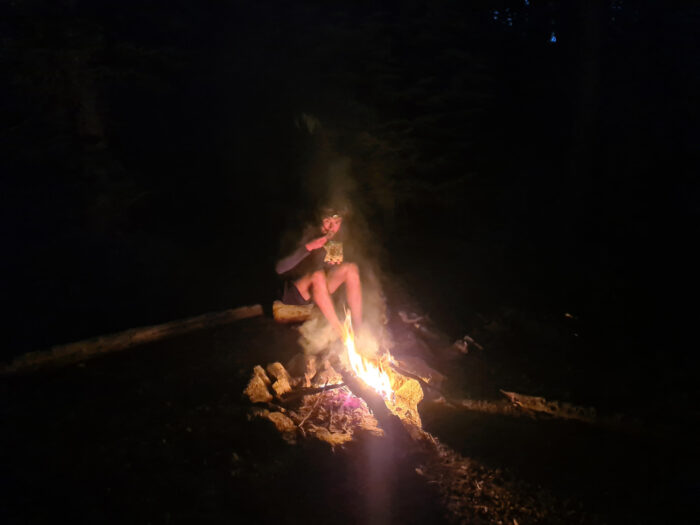
How about nutrition? What were you eating on the trail and at camp?
I was always running with a watch that was tracking my heart rate and stuff like that. So I knew I needed about 10,000 calories every day, which is huge. I did try to go into this project with some reserves — I mean, I’m never “overweight” of course, but I ate a lot the 3 months leading up to this. So I had some reserves to go through.
Kobe ran a lot with me and Henri as well, and they were asking, ‘”Do you want a Snickers bar? You want this, You want that?'” Because it got harder to eat after a while. At night, they would leave like a muffin next to my sleeping bag or something. So, I would often wake up because my muscles were cramping up. And then if I wake up, I can at least eat another muffin and go back to sleep.
And even though I’m a dentist, I drank a ton of soda on trail. So, like, every meet-up I drank at least one Coke, one Fanta, one Sprite. And then maybe another one on the go.
Did you run into any unexpected hurdles during this FKT attempt?
Toward northern Oregon, we started realizing that wildfires were going to become an issue. All of a sudden, the whole northern part of Oregon was on fire, and Washington was on fire. So I think of the last 20 days, maybe 2 days, we ran without smoke. All the rest was smoky … and then the PCT ended up being closed for 50 miles because of two wildfires on the trail. I had to do a 100-mile detour to overcome that.
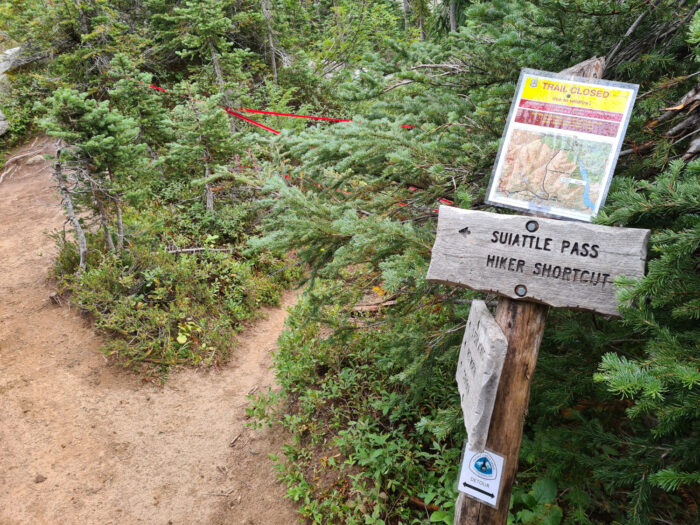
Was it emotional when you finally crossed the finish line?
Yeah, it was. We were all very tired. I never slept the last night. I did the last 100 miles in one push. That’s like, my way of showing respect to the trail. So, for sure, you end up really tired at the end. But, there was a resupply around midnight or something.
Henri had to drive 6 hours into Canada and then he hiked around an hour and a half to the border [to meet me]. So he didn’t sleep either. The whole crew didn’t sleep very much. So, they’re tired after 47 days of adventure. And yeah, it was overwhelming to finish. There were some tears.
Was all of it filmed for a documentary?
Backcountry followed along, with two or three people documenting the whole story. So, there will be a film about it released the first week of October, I think. And it will be interesting because they really [captured] the crew’s side of it, as well as my side of it.
The Gear Sabbe Used for the Pacific Crest Trail FKT
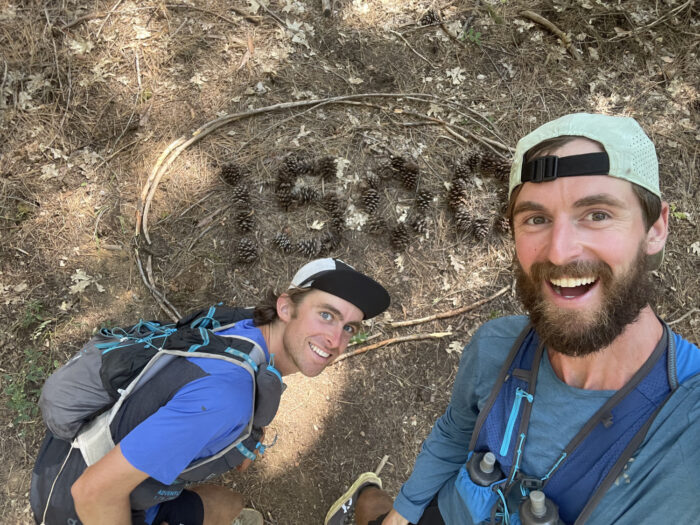
Sabbe said his gear strategy for the second PCT FKT significantly improved over his first. Not only did he have multiple pairs of shoes for different kinds of terrain, but he also understood how his feet swell up, and sized his shoes to compensate. Sabbe’s blister management skills had also improved immensely, and he had more help from his crew to resupply at their predetermined meet-up spots.
Sabbe is sponsored by On Running, Ultra Trail Coaching, Tailwind, Belgian company Cykell, Ledlenser, and Volvo. Here’s the short list of gear he said he couldn’t have run this FKT without:
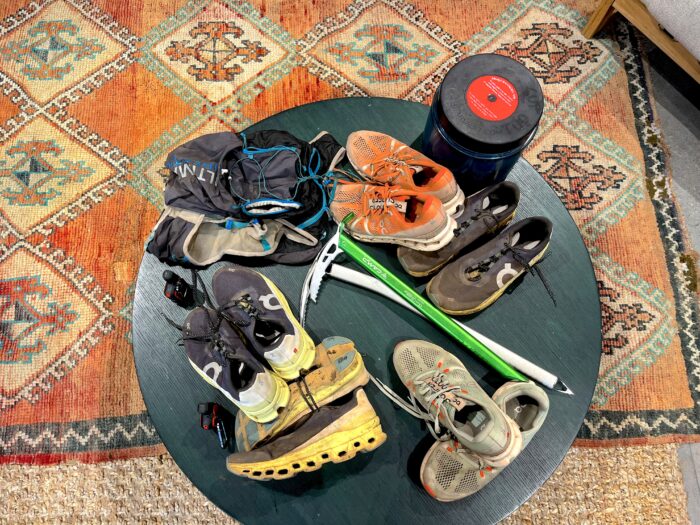
The PCT FKT Gear
- On Cloud Surfer Trail Runner: On is coming out with a trail runner version of the Cloud Surfer that Sabbe wore for most of the PCT’s desert sections.
- On Cloudmonster: Sabbe used this shoe whenever things became rocky because it has the thickest sole of any On running shoe.
- On Cloudultra: Sabbe wore this shoe for everything in between. It’s his go-to trail running shoe.
- Ultimate Direction Adventure Vest 6.0 Hydration Vest: Sabbe’s crew would have a fresh running vest with snacks and water waiting for him at every meet-up point, and they’d swap out.
- Garmin inReach Mini: This was a piece of gear that both Sabbe and his crew called “essential.” Not only did it allow his team to track his progress, but it also allowed them to text each other back and forth at any time, anywhere. For safety and general coordination, the inReach was a lynchpin.
- Ledlenser LED MH10 headlamp: For those dark mornings pounding the trail.
- Oakley Holbrook Sunglasses: Both for their style and polarization.
- On Long-sleeve performance T-shirts: Sabbe wore lightweight On performance T-shirts with sun protection and breathability. He often dunked them in stream crossings to keep his core temperature down.
- On Essential running shorts: Sabbe wore lightweight, breathable On running shorts for the entire Pacific Crest Trail.
- On running caps: Sabbe wore an On running cap (mostly backward) as he ran.
- On low-cut socks: Sabbe carried multiple pairs of low-cut, lightweight running socks that he could alternate out throughout the day.
What’s Next for Karel Sabbe?
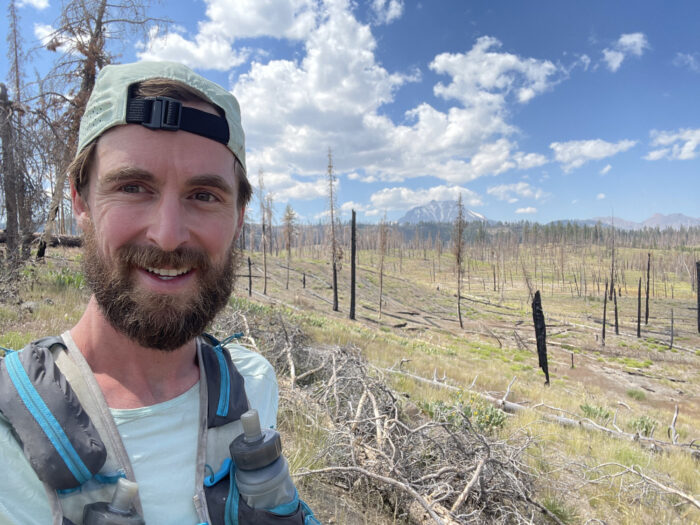
When we caught up with Sabbe, he was relaxing somewhere outside of Seattle, recovering, and spending some hard-earned downtime with his friends and family. When asked what’s next, Sabbe chuckled. Just prior to setting the Pacific Crest Trail FKT he’d finished the full, five-loop Barkley Marathons, a notoriously brutal race — one that has only ever been completed by 17 people in its 37-year history.
“So when I set out for the PCT, I did agree that when I succeed at the PCT, I’m going to take almost a year off without racing and without record events,'” he said. “I need to respect my body and my mind and give them some rest.”
Then he paused thoughtfully before adding, “But there are some unique trails still out there. For instance, there’s a trail running the entire length of New Zealand’s north to south that’s about 2,000 miles. That could be a fun one.”
Asked if he’d ever try the Pacific Crest Trail again, Sabbe shook his head with an almost sad smile.
“No. So basically, I left it in 2016 feeling proud. But then after a while, I realized with some more knowledge about doing something like that, I could do better.’ And now … I really feel I left everything out on the trail and I couldn’t do any better. Even though [the FKT] could be broken next year or in a couple of years, I’ll be happy with it. I gave it my all.”
To see the route Karel Sabbe took, and to check out more photos of the FKT, visit the website that tracked his progress. And to keep your eyes open for the documentary covering this feat, or to keep tabs on Sabbe’s future endeavors, check out his website.
